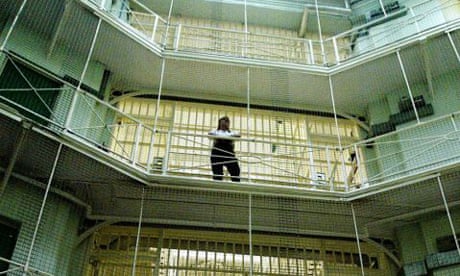Jack Straw, the justice secretary, last night made an urgent appeal to magistrates to send fewer people to jail as the prison population in England and Wales soared past 82,000 to an all-time high.
The official prison population reached 82,006 yesterday - just 21 places short of the system's official capacity - fuelled by a jump of 2,300 in prisoner numbers since the new year.
In an exclusive interview with the Guardian, Straw said the numbers were already outstripping official forecasts that were only published in December, and added that he could not rule out a further extension to the early release scheme that has seen thousands released 18 days before the end of their sentence.
"We are now running higher than forecast. The projected population at the end of March was due to be 81,731. We are not at the end of March and we are already 300 above it. The population dipped over Christmas but it has risen more than 2,000 since then," he said.
The figures show that there were 81,680 locked up in prisons in England and Wales on Wednesday night, an all-time high, with a further 282 "locked out" in police cells and 44 held overnight in court cells.
Straw announced yesterday that the 11,000 foreign national prisoners held in English jails will be able to be sent home nine months rather than four and a half months before the end of their sentence but the measure will not take effect until it gets parliamentary approval, which will take several weeks.
He said the rise in prisoners was being driven by two factors: an increase in adult men being jailed for short sentences by the magistrates courts, and a rise in the number of ex-prisoners being recalled for breaching the terms of their release.
He appealed to the 30,000 magistrates to use non-custodial penalties instead of sending them to prison for an ineffective jail term of less than 12 months.
"We have 350 magistrates courts in England and Wales. If each one ends up sentencing one more extra prisoner a week to jail then we have got the increase we face. There are effective alternatives in terms of non-custodial penalties which actually have a better record in terms of preventing reoffending than short prison sentences. The probation service has become more effective," Straw said.
The justice secretary said the drive inside prisons to convert every cell space into living accommodation had led to some being packed three to a cell designed for one. He also voiced his concern about the regular use of court cells to hold prisoners overnight, a practice sharply criticised by the chief inspector of prisons.
Straw said the prospects for using more police cells to hold prisoners were limited. There is an agreement with the police that 400 are made available each night under Operation Safeguard. But he made clear that the kind of spare cells in old bridewells that meant 3,000 prisoners a night could be held in them in the 1980s no longer existed.
He said the official prison figures, which show there are only 21 spaces left, is not the whole story. "It is not quite 21 spaces. We have got the police and court cells and there is an 'operating margin' of 2,000 places." But most of these "extra places" are unsuitable for adult male prisoners: for example, they are in women's prisons or juvenile establishments.
Straw also revealed that a decision had been taken not to overcrowd existing prisons even further by turning gyms into American-style dormitories holding 100 inmates.
"The experience in England and Wales where dormitories have been used, except in specific establishments, has been quite severe control problems."
